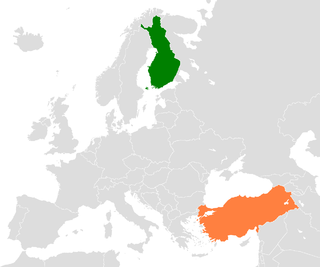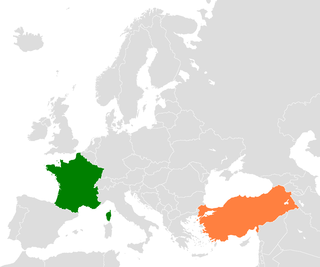
Relations between Greece and Turkey began in the 1830s following Greece's formation after its declaration of independence from the Ottoman Empire. Modern relations began when Turkey declared its formation in 1923 following the defeat of the Ottoman Empire in World War I.

Russia–Turkey relations are the bilateral relations between Russia and Turkey and their antecedent states. Relations between the two are rather cyclical. From the late 16th until the early 20th centuries, relations between the Ottoman and Russian empires were normally adverse and hostile and the two powers were engaged in numerous Russo-Turkish wars, including one of the longest wars in modern history. Russia attempted to extend its influence in the Balkans and gain control of the Bosphorus at the expense of the weakening Ottoman Empire. As a result, the diplomatic history between the two powers was extremely bitter and acrimonious up to World War I. However, in the early 1920s, as a result of the Bolshevik Russian government's assistance to Turkish revolutionaries during the Turkish War of Independence, the governments' relations warmed. Relations again turned sour at the end of WWII as the Soviet government laid territorial claims and demanded other concessions from Turkey. Turkey joined NATO in 1952 and placed itself within the Western alliance against the Warsaw Pact during the Cold War, when relations between the two countries were at their lowest level. Relations began to improve the following year, when the Soviet Union renounced its territorial claims after the death of Stalin.

Denmark–Turkey relations are the current and historical relations between Denmark and Turkey. Denmark has an embassy in Ankara, and Turkey has an embassy in Copenhagen. Both countries are members of NATO. Diplomatic relations between Denmark and Turkey were put under pressure in 2014 because of the Jyllands-Posten Muhammad cartoons controversy and the Roj TV affair (Roj TV's broadcasting license was suspended by the Supreme Court in Denmark on February 27, 2014). Denmark is a member of the European Union, Turkey is not a member.

Albania has an embassy in Ankara and a general consulate in Istanbul. Turkey has an embassy in Tirana. The most widespread religion in Albania is Islam (~59%), also in Turkey (~90%). Both are part of the Organisation of Islamic Cooperation (OIC). In addition, they are full members of the North Atlantic Treaty Organization (NATO) and Union for the Mediterranean (UfM). Turkey and Albania are candidates for accession in the European Union (EU).

Portuguese–Turkish relations are foreign relations between Portugal and Turkey. Portugal has an embassy in Ankara. Turkey has an embassy in Lisbon. Both countries are full members of NATO. Also Portugal is an EU member and Turkey is an EU candidate.

The Kingdom of Spain and the Republic of Turkey maintain diplomatic relations. Spain has an embassy in Ankara and a consulate general in Istanbul. Turkey has an embassy in Madrid and a consulate general in Barcelona.

Romanian–Turkish relations are foreign relations between Romania and Turkey. The two countries maintain longstanding historical, geographic, and cultural relations. Romania has an embassy in Ankara and two consulates-general in Istanbul and İzmir. Romania also has four honorary consulates in Turkey in İskenderun, Edirne, Trabzon and Eskişehir. Romania also has a cultural institute The Romanian Cultural Institute "Dimitrie Cantemir". Turkey has an embassy in Bucharest and a consulate-general in Constanţa. Turkey also has two honorary consulates in Cluj-Napoca and Iași. Both countries are full members of NATO, the BLACKSEAFOR and BSEC.

Croatia and Turkey established diplomatic relations in 1992. Turkey recognized independent Croatia in 1991. Croatia has an embassy in Ankara and an consulate-general in Istanbul and an 2 honorary consulates in Antalya and İzmir. Turkey has an embassy in Zagreb. Both countries are full members of Council of Europe and of NATO.

Ethiopian–Turkish relations are foreign relations between Ethiopia and Turkey. Ethiopia has an embassy in Ankara and Turkey has an embassy in Addis Ababa.

Serbian–Turkish relations are foreign relations between Serbia and Turkey. Serbia has an embassy in Ankara and a consulate-general in Istanbul. Turkey has an embassy in Belgrade. Both countries are full members of the Council of Europe, the Organization for Security and Co-operation in Europe (OSCE), the Central European Free Trade Agreement (CEFTA) and the Organization of the Black Sea Economic Cooperation (BSEC). Turkey is a member of NATO. Serbia instead is not a member of NATO.

Finland–Turkey relations are foreign relations between Finland and Turkey. Finland has an embassy in Ankara and an honorary consulate general in Istanbul and other honorary consulates in Adana, Alanya, Antalya, Belek, Bodrum, İzmir, and Kayseri. Turkey has an embassy in Helsinki. Both countries are full members of the Council of Europe, the Organisation for Economic Co-operation and Development (OECD), the Organization for Security and Co-operation in Europe (OSCE), North Atlantic Treaty Organization (NATO), and the Union for the Mediterranean.

Belgian–Turkish relations are foreign relations between Belgium and Turkey. Belgium has an embassy in Ankara, a consulate–general in Istanbul and two consulates in Antalya and İzmir. Turkey has an embassy in Brussels and a consulate–general in Antwerp.

India–Turkey relations, also called Indian-Turkish relations or Indo-Turkish relations are the bilateral relations between India and Turkey. Since the establishment of diplomatic relations between India and Turkey in 1948, political and bilateral relations have been usually characterised by warmth and cordiality, although some sporadic tensions remain due to Turkey's support for Pakistan, India's rival and India's continued support for Armenia, Greece and Cyprus against Turkey. India has an embassy in Ankara and a consulate–general in Istanbul. Turkey has an embassy in New Delhi and also a consulate-general in Mumbai. As of 2019, the bilateral trade between India and Turkey stood at US$7.8 billion.

French–Turkish relations cover a long period from the 16th century to the present, starting with the alliance established between Francis I and Suleiman the Magnificent. Relations remained essentially friendly during a period of nearly three centuries, with the resumption of intense contacts from the reign of Louis XIV. Relations became more complex with the French campaign in Egypt and Syria by Napoleon I in 1798, and the dawn of the modern era. Both countries are members of the Council of Europe and NATO. France opposes Turkey's European Union membership.

Lebanon–Turkey are the bilateral relations between Lebanon and Turkey. Lebanon has an embassy in Ankara and a consulate general in Istanbul. Turkey has an embassy in Beirut. The two nations are connected through history as Lebanon gained independence from the Ottoman Empire. Both countries are members of the Union for the Mediterranean and Organisation of Islamic Cooperation.

Bosnia and Herzegovina–Turkey relations are the bilateral relations between Bosnia-Herzegovina and Turkey. Bosnia and Herzegovina is a southeast European country, while Turkey is a transcontinental country with a small European part on the Balkan peninsula around Istanbul. Diplomatic relations between the two countries started on 29 August 1992. Bosnia and Herzegovina has one embassy in Ankara and two consulates in Istanbul and İzmir, while Turkey has one embassy in Sarajevo and one consulate in Mostar. The two countries enjoy very warm diplomatic relations, due to historical and cultural ties dating back to the 15th century. There is a large population of Bosniaks in Turkey and a smaller community of Turks in Bosnia and Herzegovina. The Istanbul quarter of Yenibosna is named in honour of the Bosnian community that has settled there since Ottoman times. Reflecting the close ties between the two nations, Bosnians and Turks are free to travel to each other's countries using only their national identification cards, without the need for a passport. Turkey gives full support to Bosnia and Herzegovina's NATO membership.

Sofagate is a diplomatic protocol incident that happened during the visit of President of the European Commission Ursula von der Leyen and President of the European Council Charles Michel to Turkey in April 2021. When Michel and von der Leyen were to meet with the Turkish President Recep Tayyip Erdoğan and Foreign Minister Mevlüt Çavuşoğlu, there were only two chairs and two sofas in the room in which they were received. Michel then seated himself in the chair beside Erdoğan while von der Leyen was offered to take a seat on a sofa in the same room across the Turkish Foreign Minister Mevlüt Çavuşoğlu. Michel as a man took the more prominent position than von der Leyen as a woman, despite both having the title President. Many commentators described the incident as sexist, as did von der Leyen herself. Later on, Çavuşoğlu called the accusations against Turkey "unfair", saying that the seating arrangement was made in accordance with the requests of the European side and added protocol officials always "meet and discuss the arrangement before each visit."



















